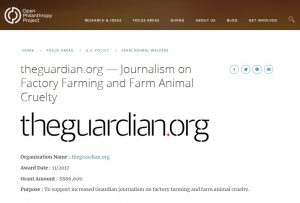
There is an entity called the Open Philanthropy Project that is funded largely from the personal fortune of billionaire Dustin Moskovitz and his wife, Cari Tuna.
Moskovitz is a co-founder of Facebook.
One focus area of the Open Philanthropy Project (OPP) is a “farm animal welfare” program, which falls under its policy efforts.
The program seeks to reform or bring an end to animal agriculture, and it has been a significant investor in rival products. Among them is an undisclosed amount of funding to Impossible Foods for “accelerating the development of multiple food categories” based on plants.
The OPP says about its policy work: “We’re interested in supporting people and organizations working to improve policy via research, public education, and other activities. … We think of our work on U.S. policy as high-risk and high-reward, with generally long time horizons. It’s hard to predict where political opportunities will arise, and how long they’ll last.”
In November 2017, the Open Philanthropy Project announced a two-year grant award from its farm animal program in the amount of $886,600 to benefit The Guardian media outlet.
The grant was specifically to support “journalism on factory farming and farm animal cruelty.” The grant money is meant to “allow The Guardian to increase its reporting output on issues related to factory farming, including publishing approximately one article per week as well as the creation of multimedia content.”
The grant was described as “both an opportunity to learn valuable lessons about the efficacy of media sponsorship, as well as an opportunity to increase the salience of farm animal welfare issues amongst influential journalists, policymakers, and business leaders” by the farm animal program officer, Lewis Bollard.
“Salience” is a fancy word for “importance” and/or “prominence.”
This kind of influence campaign – with advocacy disguised as journalism – is an example of how the philanthropy seeks to amplify and extend its policy efforts against livestock agriculture.
The Guardian media outlet says that the “only restriction to the Guardian’s coverage” is where there is a prohibition “under US law from directly funding or earmarking funds to be used in an attempt to influence legislation.”
The Guardian has expressly stated that it will rely on other OPP grant recipients for sources of information in its reports that are produced as part of the OPP grant: “The Open Philanthropy Project also funds a number of farm animal welfare groups and projects: at times, if these groups have expertise in the areas covered in a specific investigation or story, the Guardian will speak to these groups for comment and expertise.”
This arrangement with related grant recipients extends the influence campaign on behalf of the Open Philanthropy Project.
